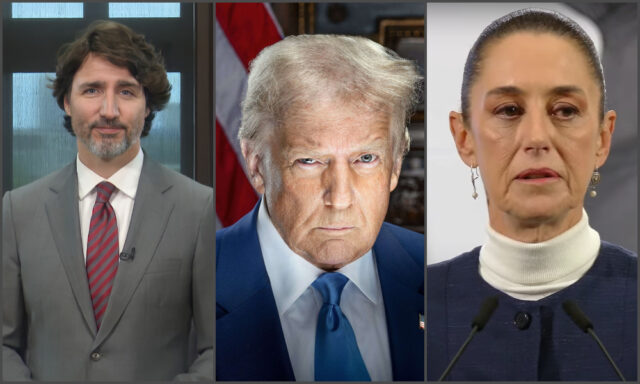Washington: President Donald Trump postponed tariffs on Mexico and Canada after discussions with their leaders on Monday. The tariffs were set to begin soon.
Trump initially proposed a 25% tariff on Mexican imports and most Canadian goods. Energy products would face a 10% tariff.
Additionally, Trump introduced a 10% tariff on Chinese goods. He mentioned upcoming discussions with China regarding trade policies.
Mexican and Canadian leaders assured Trump of stronger border security. Their commitments influenced his decision to delay tariffs.
Border Security
Trump announced on Truth Social that Mexico would deploy 10,000 soldiers to secure its border with the U.S.
These soldiers will focus on stopping fentanyl smuggling and illegal migration. Trump called this agreement a major success.
Canadian Prime Minister Justin Trudeau confirmed the tariff pause before Trump reiterated it on Truth Social.
Trudeau and Mexican President Claudia Sheinbaum emphasized their ongoing cooperation with the United States.
Trade Discussions
Trump initially announced these tariffs on Saturday, aiming to address security concerns and trade imbalances.
The 30-day pause allows negotiations to continue between the three countries. Officials will assess progress before making further decisions.
China remains a key focus in Trump’s trade strategy. He stated that talks with Chinese officials are imminent.
These tariffs were part of a broader effort to address economic challenges and national security concerns.
Leaders’ Responses
Sheinbaum expressed Mexico’s commitment to border security, stating that cooperation benefits both nations.
Trudeau welcomed the pause, emphasizing strong economic ties between Canada and the U.S.
Both leaders reassured Trump that their governments were taking significant steps to enhance security.
Trump acknowledged their efforts and reiterated his focus on protecting American interests.
Future Plans
The tariff delay offers time for further discussions among all involved parties.
Experts suggest that the next 30 days will be crucial in shaping future trade policies.
Trump remains firm on using tariffs as leverage for national security and economic concerns.
His administration continues to monitor border security improvements before making long-term decisions.











